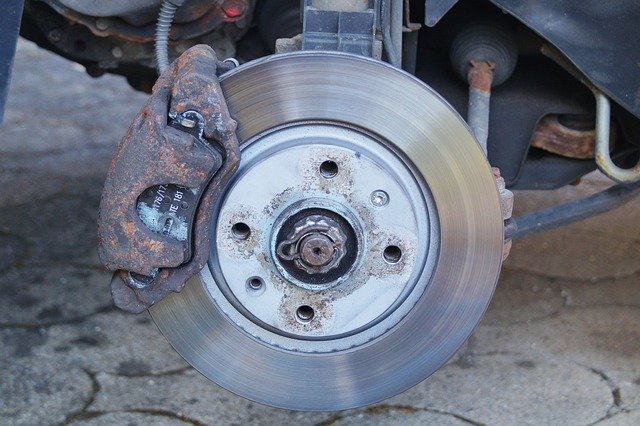Table of Contents
What’s The Easiest Way To Tell Your Brake Calipers Are Bad?
Being able to bring your car to a stop when needed is a crucial part of driving. If you aren’t able to bring your car to a stop when needed you’d likely end up with your car in a ditch on the side of the road.
That’s why it’s important to understand how your brakes work and what the signs are that they aren’t functioning properly. So, what are the symptoms of bad brake calipers?
1. Leaking Brake Fluid
One easy way that you can tell that there is something wrong with your brake calipers is that they are leaking brake fluid. If you inspect your brakes and find that there is brake fluid coming from your brake caliper this is usually an indication that they have a problem and need to be replaced.
Brake calipers can be remanufactured but if you are in a time crunch and need to just replace one of them it’s best to just buy a replacement and fix the one bad caliper. You don’t need to replace brake calipers in pairs like you would brake pads and tires.
2. Car Pulls to One Side When Braking
One way to tell that there is an issue with your brakes is that your car pulls to one side when you apply the brakes. The brake system on your car is designed to apply brake pressure equally to all four brake calipers and brake rotors.
If there is something wrong with the brakes it can cause the brake pressure to be applied unevenly which can cause your car to pull to one side or the other when the brakes are applied.
When your car pulls in one direction while braking, usually there is something wrong with a brake caliper that is causing it to clamp down on the brake rotor with more force than the others.
This can be a problem with a seized slide pin or a problem air in the brake lines causing the brake rotors to not work properly.
3. Seized Slide Pins
Brake calipers are designed to slide over the surface of brake rotors and then apply pressure to them to bring your car to a stop.
If one of the slide pins in the brake caliper has seized up, they won’t allow the pressure to subside on the brake rotor which can cause excess friction and therefore heat.
Slide pins allow the brake caliper to easily move back and forth to apply clamping pressure on the brake rotor when the brake pedal is pressed. As you let off the brake pedal the brake caliper will release pressure on the brake rotor and the brake pads should back off from the brake rotor.
A seized brake caliper slide pin means that the brake caliper can’t easily slide back and forth to apply pressure. When this happened on my car the slide pin seized up so that the brake caliper was continuously applying pressure to the brake rotor.
You can buy replacement slide pins and try replacing them before replacing the whole brake rotor but if it’s been a problem for a while the excess heat may have damaged the brake rotor meaning it will also need to be replaced.
4. Weird Smells from Car/Brake Area
Weird smells coming from your car can be caused by a variety of issues with your car. If you seem to be having weird smells coming from the area surrounding your brakes and wheel arches (and not from your engine bay) this may indicate that there is an issue with your brakes.
If you’ve ever been traveling down a highway and everyone had to come to a sudden stop, you likely smelled the smell of brake pads wearing away.
Brake pads can produce a metallic smell after heavy braking or if there is an issue causing the brake pad to not release from the brake rotor.
Driving with your parking brake engaged will cause your rear brake pads to stay engaged with your brake rotors which can superheat your brake rotors and pads causing them to put off a metallic smell.
If you accidentally do this your rear wheels will be hot to the touch so be careful.
Issues with the brake caliper seizing up can also cause your brakes to put off a metallic smell. If the brake caliper can’t properly release from the brake rotor it will cause your brake pads to be forced into the brake rotor even if the brake pedal isn’t being pressed.
This can cause your brake rotor to heat up and can also cause your brakes to put off the metallic smell of brake pads.
5. Soft Brake Pedal
Having a soft brake pedal can also be an indication that you have something wrong with your brake calipers. If one of your brake calipers is leaking brake fluid this can cause the brake fluid in your brake fluid reservoir to get low.
Obviously, if your brake fluid is drained out of your car it could have a negative impact on how well your car will be able to stop.
Eventually, if the leak wasn’t fixed enough brake fluid would leak which will make your brake pedal feel very soft to the touch. The brake pedal may also want to go all the way to the floor which should be a clear sign that there is something wrong with your brakes.
If your brake caliper is leaking brake fluid, it’s recommended to go ahead and replace it with a new one. You may get lucky and it could just be that a brake line is causing the leak.
6. Reduced Braking Power
Another symptom of a bad brake caliper is reduced braking power. If you press on your brake pedal and it no longer provides the same braking force that it previously did this can be a sign that there is something wrong with your brake caliper.
Since your brake caliper is designed to provide the necessary force to clamp onto your brake rotor to bring your car to a stop if your brake caliper isn’t working properly it makes sense that you won’t be able to come to a stop as quickly if there is a problem with one of your brake calipers.
7. Uneven Brake Pad Wear
One way to tell that there is a problem with one of your brake calipers is uneven pad wear. If you inspect your brake pads and notice that one side is much lower than the other this can be an indication that there is a problem with the brake caliper. Brake calipers are designed to provide equal force to the back of the brake pad to create friction against the brake rotor.
If there is a problem with the brake caliper the force applied by the piston in the brake caliper may be applied to one side of the pad more than the other. Over time this can create uneven brake pad wear as the brake pad material will begin to wear down on one side more than the other.
Another reason for uneven brake pad wear is improper brake pad installation. On some brake calipers, they have pins or tabs that need to be aligned with the back of the brake pad backing plate or they can cause the brake pad not to sit flat against the brake rotor surface.
As you can imagine if the brake pad isn’t sitting flat on the brake rotor this will cause uneven brake pad wear as the brake pad material will be worn off more on one side than the other.
I’ve been guilty of doing this before on my car which resulted in me needing to replace my back brake pads earlier than they should have needed to be replaced again.
How Much Does It Cost to Replace A Brake Caliper?
The cost to replace brake calipers can vary widely and will be dependent on a few factors. First front brake calipers are usually larger than rear brake calipers so they will typically cost more to replace than rear brake calipers.
Deciding to go with OEM or aftermarket brake calipers will also have an impact on the cost to replace one, as well as the manufacturer of your vehicle.
How many pistons the brake caliper has will also have an effect on the price. A brake caliper that has two or more hydraulic pistons will cost more to replace than a brake caliper with just one brake piston.
In general, you can expect to pay anywhere from $55-$450 for just one brake caliper. A set of brake calipers for a BMW M5 for example costs around $2,000. Brake calipers for my Acura are much cheaper coming in around $70-80 for a front brake caliper and $50-60 for a rear brake caliper.
When Do You Need to Replace Brake Calipers?
Brake calipers unlike brake rotors and brake pads aren’t really designed to be wear items and don’t need to be replaced unless there is a problem with them.
One easy to spot indicator that you need to replace your brake caliper includes brake fluid leaking from it. Another not so easy to spot symptom of bad brake calipers is a seized slide pin.
If you notice that your brake caliper is leaking fluid usually this is a sign that the hydraulic piston inside has a leak somewhere allowing brake fluid to spill out. When this happens, you will need to replace your brake caliper with a new one or have the old one rebuilt.
While brake calipers can be rebuilt, it will take time to have that performed. If you are in a pinch and need to get your brake caliper replaced yesterday, it’s best to just buy a new one that can be installed the same day.
Seized brake calipers might not be as easy to spot as leaking brake fluid. Really the best way to check for a seized brake caliper is to remove the brake caliper from the brake rotor so that you can inspect it.
The brake rotor slide pins should be able to freely move back and forth. If one or both slide pins are tough to move or locked in place this is usually a sign that they are seized.
You can look to replace just the slide pins to see if that helps out the situation but if it doesn’t, you’d be looking at replacing the effected brake caliper with a new one.

